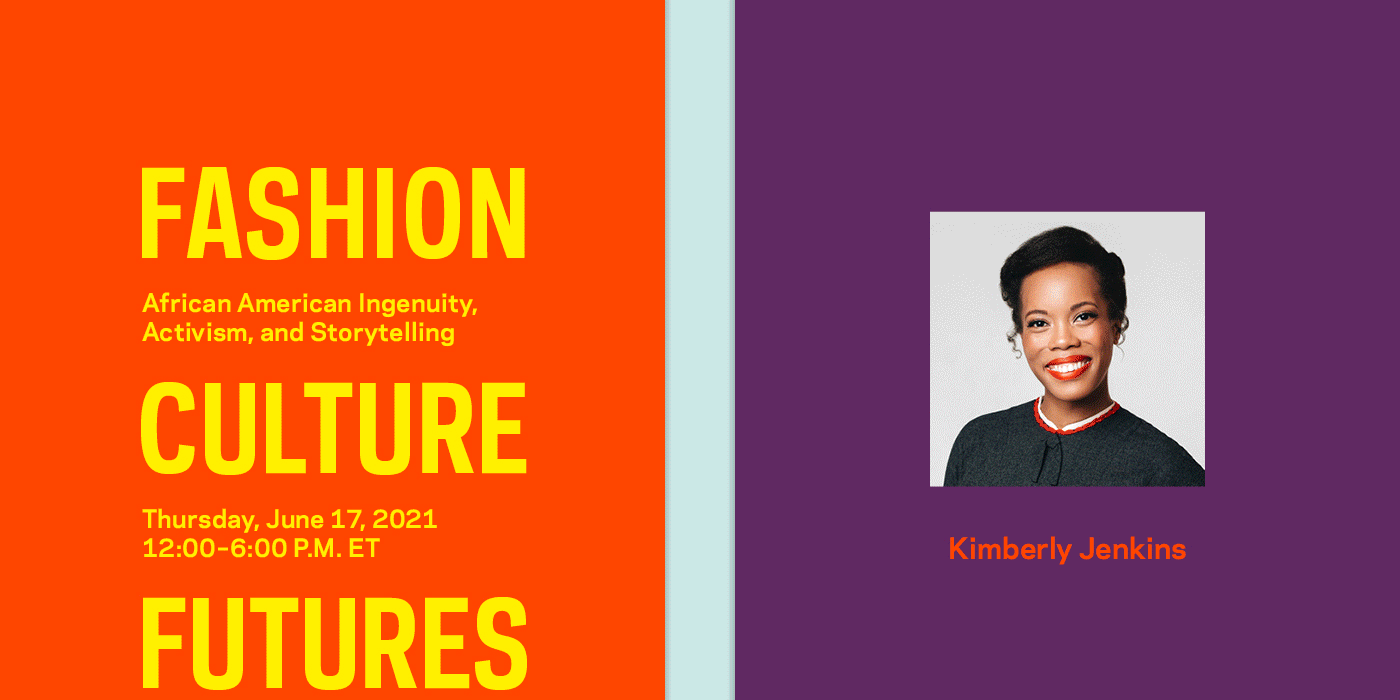Fashion, Culture, Futures: African American Ingenuity, Activism, and Storytelling
Fashion, Culture, Futures: African American Ingenuity, Activism, and Storytelling is a two-part symposium co-organized by Cooper Hewitt, Smithsonian Design Museum and the Smithsonian’s National Museum of African American History and Culture. Presented virtually Thursday, June 17, and Thursday, Oct. 21, both programs will bring together academics, designers, critics, models, artists, activists and others to share new perspectives on the relationship between fashion and the African American experience.
Join Cooper Hewitt on June 17, 2021 for part one of the symposium, which will tackle the complex network of artists, innovators and image makers that influence the field of fashion. Inspired by Cooper Hewitt’s current Willi Smith: Street Couture exhibition and Willi Smith’s efforts to use fashion to express broader ideas about representation, inclusion and diversity, the program will illuminate how African American creatives are leading innovation and change within the contemporary fashion system.
The Oct. 21 symposium, presented by the National Museum of African American History and Culture, will explore the inspirational ways that African Americans have and will continue to redefine the fashion industry. Even as they have faced inequality, discrimination and misrepresentation, African Americans have creatively influenced and been influenced by the fashion industry. The conference covers the following topics: historical and contemporary contributions of African Americans, fashion collections at the National Museum of African American History and Culture, LGBTQ+ influences on fashion, modeling during and after segregation, social media and fashion, and African Americans in the global world of fashion. Program details will be announced at will be announced at nmaahc.si.edu.
Program Schedule
Welcome
12:00–12:10 p.m.
Remarks by Lonnie Bunch, Secretary of the Smithsonian, and Ruki Neuhold-Ravikumar, interim director of Cooper Hewitt.
Introduction
12:10–12:30 p.m.
Kimberly Jenkins, a leading voice on the intersection of fashion and race, will track the historical and political influence of African Americans on the fashion system. Learn more.
Celebrating Black Bodies in Contemporary Fashion
12:30–1:25 p.m.
Featuring photographer Kennedi Carter, model Aaron Rose Philip, and Co Founder of WangaWoman | CEO of ESSENCE Caroline Wanga, this program will explore how African Americans are represented across the fashion industry. Moderated by Jenkins, panelists will address how their work highlights a spectrum of Blackness within fashion, media, and popular culture. Learn more.
Confusing the Algorithm | Fashion, Surveillance, and Racial Bias
1:30–2:25 p.m.
As technological advances have amplified surveillance tactics, the fashion industry has emerged as a poignant medium of subversion and critique. Moderated by Cooper Hewitt’s Curator of Contemporary Design Alexandra Cunningham Cameron, panelists include interdisciplinary performance artist Maud Acheampong, Associate at Adjaye Associates and Founder and Executive Director of Beyond the Built Environment Pascale Sablan, and fashion design practitioner Chinouk Filique de Miranda. Learn more.
Viewing of WilliWear Spring 1986 Expedition Film
2:30–2:55 p.m.
Willi Smith conceived Expedition as a new format for presenting the WilliWear spring 1986 collection. With the introduction of this film viewing by Cooper Hewitt’s Curatorial Program Assistant, Myra Edmonds, Expedition by Max Vadukul embodies WilliWear’s embrace of film as a mechanism for disseminating fashion concepts beyond the runway and Smith’s desire to draw inspiration from and reflect on his African heritage while encouraging his audience to explore African cultures. Read Max Vadukul’s account.
Sustainable Fashion Practice from Africa to North America
3:00–3:55 p.m.
This program brings together artist Tahir Carl Mohez Karmali, fashion entrepreneur Abrima Erwiah of Studio One Eighty Nine, and environmental equity consultant Teju Adisa-Farrar to discuss worker welfare, the environmental impact of the fashion industry, and how Black creatives are advancing models for change based in heritage and handcraft. Learn more.
Aesthetics of Freedom | Hypervisibility in Modest and Queer Fashions
4:00–4:55 p.m.
Modest fashion and style birthed from queer experiences have been historically excluded by social and political codes and misappropriated by the broader fashion system. Moderated by Cooper Hewitt’s Education Associate Darnell-Jamal Lisby, this conversation explores ways these systemic pitfalls have been creatively combatted. Speakers include the Founder of UMMA Models Shannie, and artist Brendan Fernandes. Learn more.
Keynote Conversation with Law Roach
5:00–6:00 p.m.
As the image architect to some of the most prominent Hollywood rising stars like Zendaya and the Hollywood Reporter’s 2021 Top Stylist of the Year, Law Roach’s vision as a creative is shaping the future of fashion and media. This program will center Roach’s process and experiences, touching on the various points discussed throughout the day. Learn more.
Accessibility
The symposium is free to attend and open to the public. The program link will be sent to all registered participants via email during the week of the program. Please check your spam folder or email us at CHEducation@si.edu if you do not receive it. This program includes closed captioning. For general questions or if we can provide additional accessibility services or accommodations to support your participation in this program, please email us at CHEducation@si.edu or let us know when registering.
Special Thanks
Fashion, Culture, Futures: African American Ingenuity, Activism, and Storytelling is co-organized by Cooper Hewitt, Smithsonian Design Museum and the National Museum of African American History and Culture.
Principal support is provided by ![]()
Major support is provided by ![]()
Funding is also provided by The Keith Haring Foundation and One Smithsonian.
